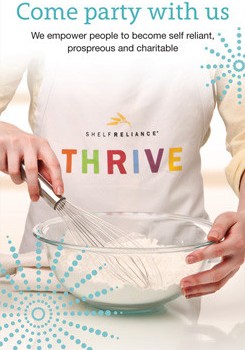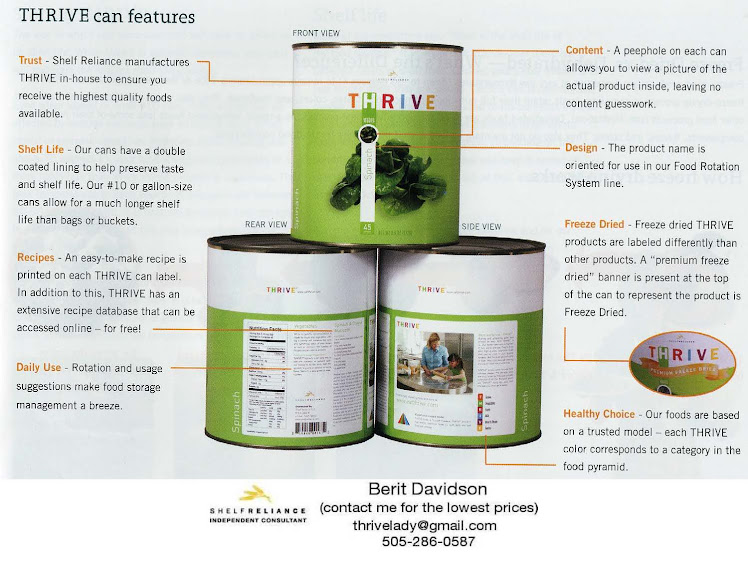 Is a one-year supply of food enough? What about a two-year supply?
Is a one-year supply of food enough? What about a two-year supply?If people are fortunate enough to find storable food that they can trust, and if they are fortunate enough to get it stored before it disappears or becomes illegal, and if they're wise enough to get more than a 1-year supply, here's how that supply must be handled.
 We must not touch any of that supply until every other alternative has been completely exhausted. When we can no longer grow food in our plowed up lawns, barter, spend cash or trade our cars and other possessions for food, then and only then, should we break open this supply.
We must not touch any of that supply until every other alternative has been completely exhausted. When we can no longer grow food in our plowed up lawns, barter, spend cash or trade our cars and other possessions for food, then and only then, should we break open this supply.You see when conditions have reached the point where the "food of last resort" has to be used, the survival clock starts ticking. If there is only a 2-year supply, that's exactly how long the family has to come up with a miracle to solve the problem of survival.
What about putting in a little at a time starting with a few basic grains and building up your supply gradually? Not a good option - see why.
Let's talk about "nickel and dimeing" a supply - putting in a little at a time starting with a few basic grains and building up gradually. Ten years ago that was an option, not now. Whatever is missing in that supply needs to be filled in immediately. If the supply isn't complete and nutritionally balanced, it is not a supply.
For example, let's look at two families.
One family has a 1-year supply of all the "basic" grains. The other family has a 3-month supply of fruit, vegetables, dairy products, proteins, grains and cereals. In short a complete and balanced supply.
 How long will each family survive?
How long will each family survive?- The family with the grains will make it a few days before the beginning of dysentery, and scurvy - the illnesses the pioneers experienced on the same diet.
- The other family with the balanced supply will be fine for at least 3 months. Their only problem is poor judgment in the quantity of supply.
How much is enough? That's up to every family. Is it better to have what you don't need or to need what you don't have?
QUOTES:
"By failing to prepare you are preparing to fail" - Benjamin Franklin
"The sad thing is if an American talks about prepping or getting ready for disasters they are looked at like they are paranoid. Most preppers, survivalists, etc. keep their lifestyle secret. Too many Americans have grown up believing that the government is their mother, father and Santa Claus all rolled into one. They cannot or will not believe that it's possible for the lights not to come on, the Walmart trucks not to run or the gas stations to run out of fuel. We grow up learning history about those with self reliance and a pioneer spirit yet most Americans today want to be coddled like small children. It really is sad how far the average American citizen has fallen over the last few decades."
"Most of us preppers are normal people. I have an advanced degree and work in a high rise office building. The only difference between me and someone who is not prepared is that I have plans and supplies in place for disasters, be they natural or man-made. I also have many friends (here in the Midwest) who are doing the same. We had a snowstorm here this year that illustrated the contrast. In anticipation of the storm, many people went to the grocery store (I did not, because I have plenty of food). On local news, they showed the store shelves had been cleaned out. The average grocery in the United States does not have more than 1-2 days' worth of food on its shelves. Think about that, and whether you owe it to yourself and your family to have your own stockpile."
Personal Disasters: "It is far more likely that we find ourselves laid off, having health problems or injuries that sap financial resources and prevent work or having friends, family members and neighbors in some category of personal disaster (as opposed to a disaster that affects everyone in a geographic area). In my circle of contacts, I have more examples of people using home storage and preparedness methods to resolve these issues than I have from the catastrophic earthquakes and storms through which I have lived.
Also, based on my circle of contacts, the storage defense issue is way overplayed in the article. Most people I know who pursue preparedness as a goal are extremely generous people and share what they have. I have personally been the beneficiary of that generosity when times have been tough."
"Having a fully prepared and self-reliant society, one which is not dependent or reliant on government to solve their problems would virtually eliminate any need or desire for socialism. If all who were able to work, would work, rather than drain the systems resources, then there would be enough wealth amongst the giving to help those who truly do need it through charity."






















.jpg)








No comments:
Post a Comment